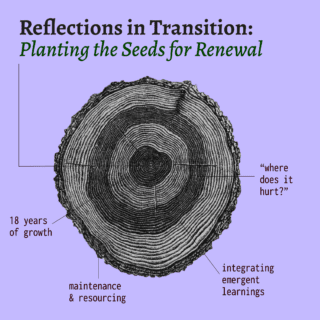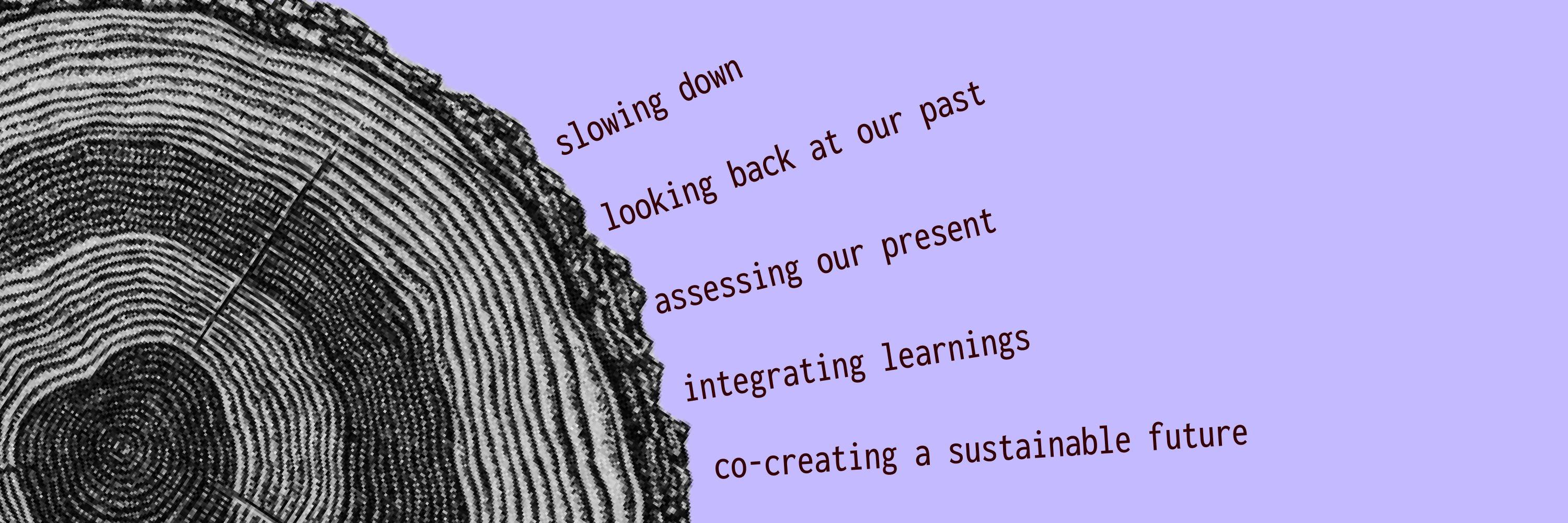
March 28, 2024
Reflections in Transition: Planting the Seeds for Renewal
By Aloma AntaoEducopia is 18 years old—a milestone year. At this milestone, we’re taking a moment to pause in our journey and survey our landscape and the results of the seeds we have planted, i.e., the communities, initiatives, and opportunities that we have nurtured and stewarded. We have contributed to transformational, systems-level change in the knowledge landscape for close to two decades. In all that time, one thing has remained true: organizational health and organizational learning are inseparable.

Each year a tree lays down a new layer of growth, or ring, around its trunk. Generally speaking, in good years—when trees grow well—the rings are wide, and, in bad years, the rings are narrow. Examining our organizational ‘tree rings’ allows us to look back at our past and assess our present to inform our future. We are more sustainable and moving in closer alignment with our values when we slow down and integrate our learnings.
Becoming a learning organization is critical to navigating the conditions that we live in today—recovering from a global pandemic, systemic oppression, rising authoritarianism, economic instability, armed conflict, and climate change, all of which disproportionately impact historically underrepresented groups. As an organization that functions as a network of networks, or a community of communities, we are committed to sharing our learnings as we strategically co-create pathways towards knowledge justice, confront the harms we have perpetuated, and articulate a clear path towards equitable resourcing.
The capacity building support we’ve received from the Mellon Foundation has afforded us the rare and precious gift of time to:
- slow down
- test our hypothesis around effective interventions for change
- document outcomes
- adapt to learnings
When we wrote the general operating support proposal in 2022, we named specific organizational growth areas and a plan for change. This plan was based on our experience and observations to date. From the start of implementation in April 2023, critical, granular, and systematic examination of the interplay between our organizational model, business model, and strategy has validated many of our initial assumptions. At the same time, the process is an emergent one, and we’ve had to hold space for things that were revealed to us at different stages.
Learning often starts with a question, and over the last few months, we’ve been asking ourselves some hard ones:
Question 1: How do we draw on our past in order to know where we are going?
As an organization that works towards the creation, sharing, and preservation of knowledge, we haven’t been able to cultivate our mechanisms for organizational learning at the scale that we hoped to (i.e., moving out of silos to inform the organization as a whole). In fact, our learning curve related to accurately costing and staffing our sources of unrestricted revenue (e.g., our Fiscal Hosting services as well as our Consulting offering) has been significant, in large part due to Educopia’s track record of success with grant-funded initiatives.
Since project-based funding is restricted to named personnel and line-item expenses related to specific grant activities, time for essential organizational development (including strengthening operational scaffolding, program evaluation and planning, and business planning) has been severely constrained. Ultimately, Educopia faces the same challenges that its partners do. Underinvestment in operational scaffolding has resulted in what’s known in facilities management as deferred maintenance. In Educopia’s context, organizational deferred maintenance means that we have had to prioritize responsiveness to partners and delivery of services over developing scalable infrastructure that enables support for those services long term (1).
As with any form of organizational deferred maintenance, if there isn’t deliberative capital investment of resources to audit and prioritize the backlog and simultaneously increase preventive maintenance tasks (PMs), the felt impacts and costs only compound over time. When central operations lack essential resources, we’re unable to formalize and streamline business processes, or responsibly shift the business model to account for rising costs of inflation and salary increases. It also curtails our ability to assess and implement data-informed strategic planning, since we’re unable to direct resources towards building the data infrastructure necessary for activities like assessing progress towards equity-centered program and operational goals, or providing scalable support for a growing portfolio of fiscally-sponsored programs. Since these programs rely on these processes and infrastructures for the health of their own operations, these factors create an unsustainable feedback loop.
Without these intersecting infrastructures, gaps emerge in our ways of working, which can perpetuate harmful practices such as unrecognized “sweat equity”. Sweat equity is a notion that we will be unpacking in upcoming Reflections in Transition, as well as in our day-to-day, in the months to come.
We have been taking time to: Develop and implement an organizational development roadmap that will ensure ongoing sustainability and growth of Educopia’s mutually reinforcing programs in ways that “shorten the distance between our values and actions(2).”
Question 2: How might we cultivate our interdependence?
At Educopia, we believe that personal transformation is prerequisite to field-level, sector-level transformation. In order to stay true to this belief, our organizational strategy cannot be held by a few people, but needs to be co-owned, explicit, and distributed across interdependent individuals and manifested across our networks.
To that end, we have engaged in organizational development and culture-building work, in order to create the conditions (strengthening strategic thinking, leadership, sustainable labor conditions, and decision-making capacity across staff) to enable “more expansive manifestations of shared leadership, ones in which power is cultivated and shared in ways that prefigure the future we envision (3 4).” We’re building towards organizational maturity and holistic sustainability by introducing new models grounded in shared leadership, equity, and abundance.
This process has already yielded so much through the generosity of the communities, partners, and peers who are guiding and walking alongside us in our journey. They have introduced us to a world of learning by openly sharing their resources, frameworks, methodologies, tools, and connections. Our perspectives and ways of working have been deeply enriched and expanded by the readings, practical innovations, and lived experiences we’ve been absorbing, as we carefully navigate the intersection between plans and emergent processes–holding both complexity and ambiguity. In reflections to come, we will stay true to our characterization of Educopia as a ‘site of knowledge exchange’ and share these tools and frameworks as open education resources, enabling the knowledge communities in our networks to use them to nurture the health and sustainability of their own collaborative networks.
We have been taking time to: Articulate an equity-centered, organizational strategic framework reflecting participation from Educopia’s Board, Staff, and community partners; this includes an explicit, clear and shared set of equity-centered organizational priorities and strategies that could be further interpreted at programmatic and operational levels.
Question 3: Tending to the Roots, i.e., Where Does It Hurt?
The introspective processes we’re engaging in have forced us to reckon with some foundational questions, including clarifying and affirming the purpose of Educopia’s existence; anchoring our services and value proposition to long-term sustainability; and acknowledging and confronting the imbalances that many nonprofits and knowledge workers have been conditioned into—including being under-resourced while carrying out essential operational functions and working through burnout.
In summary, and in Ora Grodsky’s words, we’re asking: Where does it hurt?
Following this thread, Ora Grodsky’s Guiding Ideas have proved to be an invaluable resource to us during our strategic planning process, functioning as a diagnostic tool that asks us to consider and explicitly articulate:
- why our organization exists (Educopia’s Purpose)
- what are the beliefs on which we stand (our Values)
- what we are here to do (our Mission)
- the impact we seek to have as a result of our work (our Vision)
- what we believe needs to happen in order to achieve that impact (our Theory of Change)
- what we hope to accomplish in the near, medium and long term (our Goals and Objectives).
In tending to these questions, we’ve been tending to Educopia’s organizational health, getting right to our roots. Across our workstreams and functions, we’ve been conducting check-ins and practicing into equitable decision-making processes to ensure that we’re aligned to, understand and can see our individual contributions reflected in our collective Guiding Ideas. This has involved its fair share of unlearning, including moving away from rhetoric to hold shared, plain-language definitions of the terms we’re using to describe our work. We’ve been designing facilitated spaces and interactions to hear from different stakeholders in our ecosystem and to access different forms of knowing. Most importantly, we’ve had to clarify what needs to shift or change to realize our aspirations, and lay out grounded strategies to strengthen our financial and cultural infrastructure, in order to sustainably resource our people and programs.
We have been taking time to: Explore and interrogate our current context, strengths, and aspirations to articulate a new Vision and Mission, as well as associated Strategic Areas, Impact & Internal Goals, and shared Definitions. Stay tuned for more!
We have heard time and time again from partners and peers, “Educopia is synonymous with community-controlled infrastructure and collective action.” This still holds true. Educopia will continue to work with knowledge communities to operationalize equity, collaborate to create systems-level change, and create accessible pathways to opportunity. The change we are marking is in who we’re centering in our work and what we’re learning together, and in how we’re approaching this work, i.e., amplifying equity and sustainability across our services and the ways in which we deliver them.
1. Resources and examples include GEO’s “What is General Operating Support and Why is it Important?” (https://www.geofunders.org/resources/what-is-general-operating-support-and-why-is-it- important-678), Shiloh Turner, Kathy Merchant, John Kania, and Ellen Martin’s “Understanding the Value of Backbone Organizations in Collective Impact: Part 2” (https://ssir.org/articles/entry/understanding_the_value_of_backbone_
organizations_in_collective_impact_2), Elly Brown’s “Sustaining the Backbone” (https://impactcubed.org/sustaining-the-backbone/), and Hannah Martin and Kate Gehling’s “Making the Case: Foundation Leaders on the Importance of Multiyear General Operating Support” (http://cep.org/wp-content/uploads/2020/10/CEP_MYGOS_Profiles_FNL.pdf).
2. Mariame Kaba, interview with Prentis Hemphill, Finding Our Way, podcast audio, July 5, 2022, https://www.finding ourwaypodcast.com/individual-episodes/s2e12.
3. Aja Couchois Duncan, Mark Leach, Elissa Sloan Perry, and Natasha Winegar, “Butterflies, Pads, and Pods: Interdependent Leadership for the World We Want,” Change Elemental, October 2021, https://changeelemental.org /resources/butterflies-pads-and-pods/.
4. Simon Mont, “The Future of Nonprofit Leadership,” Nonprofit Quarterly, March 2017, https://nonprofitquarterly.org/future-nonprofit- leadership/.